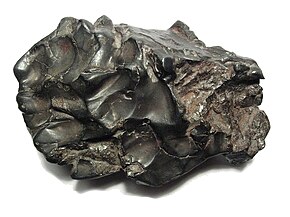Template:Infobox meteorite/doc
Appearance
| This is a documentation subpage for Template:Infobox meteorite. It may contain usage information, categories and other content that is not part of the original template page. |
| This template employs intricate features of template syntax.
You are encouraged to familiarise yourself with its setup and parser functions before editing the template. If your edit causes unexpected problems, please undo it quickly, as this template may appear on a large number of pages. You can conduct experiments, and should test all major changes, in either this template's sandbox, the general template sandbox, or your user space before changing anything here. |
| Sikhote-Alin | |
|---|---|
 thumbprinted Sikhote-Alin sample | |
| Type | Iron |
| Structural classification | Coarsest octahedrite |
| Class | Magmatic |
| Group | IIAB |
| Composition | 93% Fe, 5.9% Ni, 0.42% Co, 0.46% P, 0.28 S |
| Country | Russia |
| Region | Sikhote-Alin Mountains, Primorye |
| Coordinates | 46°09′36″N 134°39′12″E / 46.16000°N 134.65333°E |
| Observed fall | Yes |
| Fall date | 12 February 1947 |
| TKW | 23 MT |
| Strewn field | No |
This template can be used to provide comparative, at-a-glance information on meteorites.
Usage
[edit]Copy and paste the following lines at the beginning of the document and then fill with data. Do not edit the first line and field names.
{{Infobox meteorite
|Name =
|Alternative names =
|Image =
|Image_caption =
|Type =
|Class =
|Clan =
|Group =
|Grouplet = <!-- For groups n<5 -->
|Subgroup =
|Structural_classification =
|Parent body =
|Composition =
|Shock =
|Weathering =
|Country =
|Region =
|Lat_Long = <!-- {{coord|00|00|N|00|00|E|display=inline,title}} -->
|Observed_fall =
|Fall_date =
|Found_date =
|TKW =
|Strewn_field =
|Image2 =
|Image2_caption =
}}
Parameters
[edit]Bold fields are mandatory.
| Field | Description |
|---|---|
| Name | Official name of the meteorite without any abbreviation; for the avoidance of doubt see [1]. Examples: Willamette or not Willamette Meteorite, or Sayh al Uhaymir 001 not SAU 001. The article is automatically placed into [[Category:Meteorites by name|<name>]]. |
| Alternative names | Comma separated list of alternative names. |
| Image | Image name without File: or other wikitext e.g. Willamette Meteorite AMNH.jpg. If there is no image the article is automatically placed into Category:Wikipedia infobox meteorite articles without images. |
| Image_caption | Most captions draw attention to something in the image that is not obvious, such as its relevance to the text. See Wikipedia:Manual of Style/Captions. |
| Image_alt_text | Description of the image for visually impaired readers. See Wikipedia:Alternative text for images. |
| Type | Choose from the first column of Table 1 below so that the template can automatically place the article into the appropriate category e.g. [[Category:<Type> meteorites]] |
| Class | Choose from the middle column of Table 1 below. |
| Clan | A clan name from a referenced source. |
| Group | Likely to be in the last column of Table 1 below. |
| Type | Class | Group |
| Chondrite | [[Carbonaceous chondrite]] | CI, CV, CM, CR, CH, CB, CK, CO, C ungrouped |
| [[Ordinary chondrite]] | H3, H4, H5, L3, LL6, etc... | |
| [[Enstatite chondrite]] | EH, EL | |
| [[Rumuruti chondrite]] | ||
| [[Kakangari chondrite]] | ||
| Achondrite | [[Primitive achondrite]] | Acapulcoite, Lodranite, Winonaite |
| [[Asteroidal achondrite]] | [[Howardite]], [[Eucrite]], [[Diogenite]], [[Aubrite]], [[Angrite]], [[Ureilite]], Brachinite | |
| [[Lunar meteorite]] | Mare basalts, Impact breccia | |
| [[Martian meteorite]] | [[Shergottite]], [[Nakhlite]], [[Chassignite]], OPX | |
| Iron | Nonmagmatic | IAB, IIE, Udei Station grouplet, Pitts grouplet, sLL, sLM, sLH, sHL, sHH |
| Magmatic | IC, IIAB, IIC, IID, IIF, IIG, IIIAB, IIIE, IIIF, IVA, IVB | |
| Stony-iron | [[Pallasite]] | Main group, Eagle Station grouplet, Pyroxene grouplet |
| [[Mesosiderite]] |
| Field | Description |
|---|---|
| Structural_classification | Only for irons and, if applicable, stony-irons. Choose from:
|
| Parent_body | Best referenced guess or Unknown. |
| Composition | Chemical (irons) or mineral (stony) composition (e.g. 93% Fe, 5.9% Ni, 0.42% Co, 0.46% P) |
| Shock | For example, S4, see Meteorite shock stage. |
| Weathering | For example, W1, see meteorite weathering. |
| Country | For example, United States or Sweden. |
| Region | For example, Oregon or Uppsala. |
| Lat_Long | Coordinates using this format {{coord|46|09|N|134|39|E|display=inline,title}}; if omitted, the article is placed in Category:Wikipedia infobox meteorite articles without coordinates. |
| Observed_fall | Yes or No; if "Yes", automatically places the article into Category:Meteorite falls. |
| Fall_date | Date of the observed fall in YYYY-MM-DD format to the level of detail known (e.g. 1947-02-12) or estimated date (e.g. 20,000 years ago). |
| Found_date | Date of find in YYYY-MM-DD format to the level of detail known. |
| TKW | The total known weight in both metric and imperial units using {{convert}} e.g. {{convert|300|kg}} |
| Strewn_field | Yes or No. Yes means that the strewn field is documented (in the literature). Falls often have one but not all do. Finds often don't. If set to "Yes" the article is automatically placed into Category:Strewn field (meteorite) |
| Image2 | a second image showing additional details (e.g. chondrules or Widmanstätten pattern, see for example Gibeon (meteorite)) |
| Image2_caption | short description of the second image (e.g. Widmanstätten pattern) |
| Image2_alt_text | Description of the image for visually impaired readers. See Wikipedia:Alternative text for images. |
See also
[edit]- ^ See Meteorite classification
- ^ O. Richard Norton. The Cambridge encyclopedia of meteorites. UK, Cambridge University Press, 2002. ISBN 0521621437.
